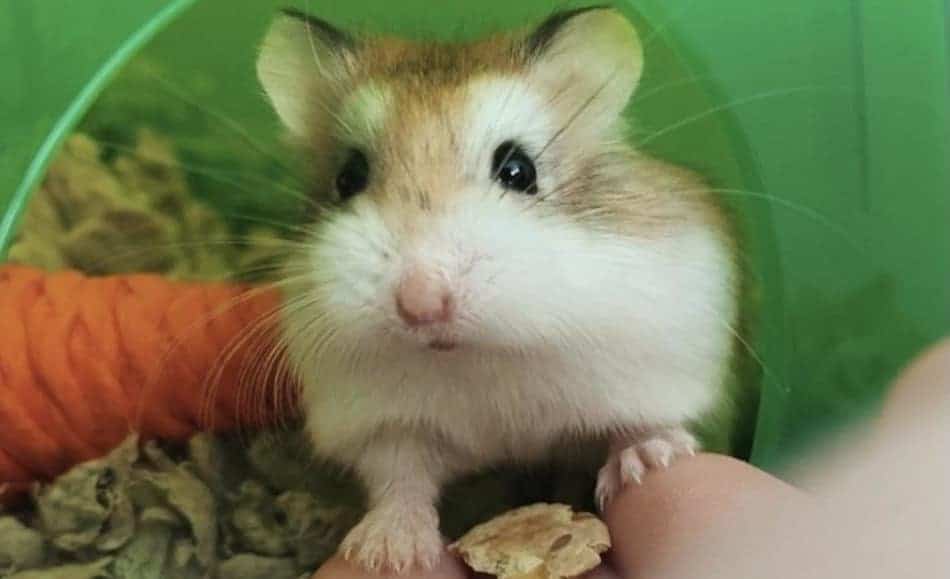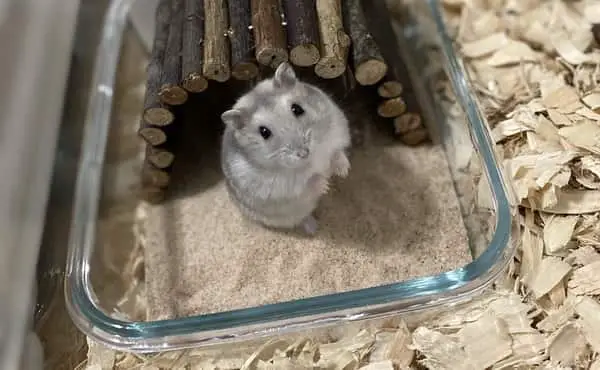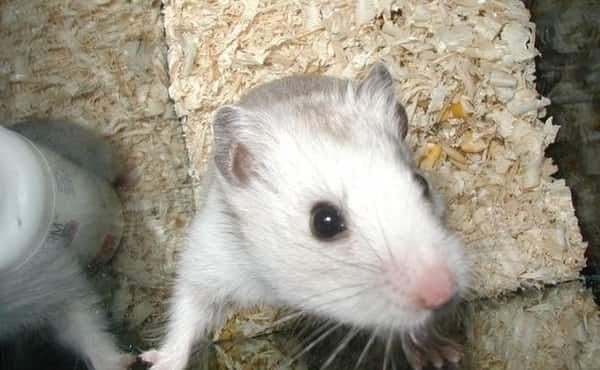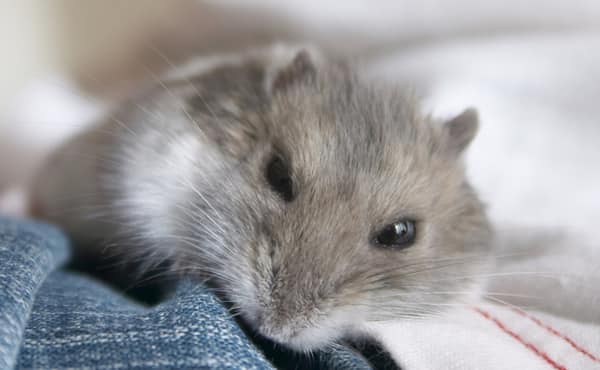Often, when people bring hamsters into their homes, they are not prepared for how many quirks come along with them, like unexpectedly rolling onto their backs. Usually, peculiar hamster behavior is not necessarily any cause for concern, but for most owners it always feels better to be informed.
Why do hamsters roll on their back? Depending on the frequency and style of the roll, your hamster likely is rolling to bathe itself. Of course, there may be other things going on, but there probably is no reason to fear.
This article will help determine the drivers behind hamster rolling around behavior by examining bathing habits and needs, and by exploring how stress or fear could affect your furry pal. Additionally, we will discuss illness as a possible reason for this behavior, as well as the impact of simple personal preference.
Time for a Bath
Sometimes things crop up with our furry friends that we may not be prepared to address, and that is okay—it is more common than one might think, especially with deceptively complex little creatures like hamsters.
It sometimes takes effort to translate odd behaviors because of the contextual nature of hamster communication, but rest assured, once you familiarize yourself with what your pal is trying to say, determining what is driving behaviors like rolling on their backs becomes second nature.
If your furry friend takes frequent breaks out of its busy day to roll on its back, chances are it is trying to bathe itself in the substrate, or bedding, of its enclosure. Hamsters are meticulous groomers, but sometimes they need to roll around a little bit to clear their silky coats of extra dirt or grime that regular grooming did not get.
This behavior could be driven by hygiene, habit, or enjoyment, especially if your hamster is new to your home and was offered a sand bath in its previous environment as enrichment. Conversely, it could be that your pal is feeling itchy because of a skin condition or parasite, in which case it would be compelled to itch or clean its skin via rolling.
Hamsters are susceptible to several skin conditions including ringworm and allergic (or contact) dermatitis. Further, there are several kinds of mites, in addition to fleas and lice, that can affect your furry friend.
If you noticed that your hamster has recently started this behavior, use a small animal comb or soft-bristled toothbrush to brush through and part its fur so you can examine your friend for hitchhikers.
If you see evidence of parasites or a skin condition, such as redness, flakiness, or open sores on the skin, schedule a visit with your veterinarian. Treatment for these conditions is usually uncomplicated so there is no reason to fear if you catch it quickly enough.
If there is no evidence of an infection or parasite, it could be that your friend just needs a sand bath to help with their grooming regimen, especially if your hamster is prone to oily fur. A sand bath is simply a dish or bowl heavy enough to keep from tipping (preferably made from ceramic or similar material) filled with one or two inches of clean sand for your pal to roll around in.
Chinchilla or reptile sand are often recommended for hamsters, as anything lower quality tends to be dusty and could harm their respiratory systems. However, you can use play sand if it has been sifted and baked in the oven at 325 degrees Fahrenheit for about an hour.
Offering a sand bath is a win-win for your furry friend, as it helps them stay clean and is a great source of enrichment. Finally, make sure to keep the enclosure itself clean. Scoop out soiled bedding every day and change out bedding in the whole enclosure about once a week to make sure your hamster’s hygiene stays on-point.
If you do not think your hamster is rolling around as part of its beauty routine, it could be that something a little more serious is occurring.
Under Pressure
Depending on when your hamster rolls and how the behavior is displayed, your pal might be experiencing stress or fear, particularly if the rolls appear to be compulsive or repetitive. Hamsters are prey animals in the wild, used to being hunted by numerous predators, so their instincts are to be fearful of almost everything.
Even in a domestic setting, those instincts are still strong since our housebound companions are only removed from their wild cousins by a century or so, making them very prone to stress and subsequent issues. When your friend is rolling on its back, watch for other signs of stress and/or fear like these:
- Lying on its back with incisors exposed
- Freezing in place
- Puffing up cheek pouches
- Standing on hind legs
- Hyperactivity
- Unusual or compulsive behavior (in this case, if your hamster does not seem to be 100% in control of its action when it rolls or flips, as if it were a twitch, or is coupled with bar biting or excessive grooming)
- Uncharacteristic aggression (toward you, other pets, or cage mates)
- Grunting, snorting, or squealing
If your hamster is displaying any of these signs or signals, there are a few things to consider and, luckily, plenty of ways to assuage your pal’s anxiety. Did you recently bring your pet home from the pet store or breeder?
If so, it might just need some time to adjust and understand that it is safe in its new environment. Is your hamster’s environment kept quiet and separate from sudden, loud noises, rambunctious children, or other pets? If not, it might be time to reconsider the room your hamster calls home, as many of these things will trigger stress and fear in your tiny companion.
To help your furry friend feel welcome, calm, and safe, there are a few things you can do. First, always talk to your friend in a relaxed, quiet voice. If your pet is new in your home, give it a few days to adjust before you try to pick it up or interact with it. Keep the environment quiet and lit very gently as bright lights can be overwhelming for our nocturnal friends.
Speaking of nocturnal, as tempting as it may be to try to play throughout the day, do not wake your hamster when it is sleeping, as this could elicit a startled response, resulting in grumpiness and/or a sharp bite.
Always handle your hamster gently, preferably in the evening, and offer treats and pets while you are interacting to help them understand you are their friend. Finally, be alert for the body language cues they are showing you so you can always tell how your friend is feeling.
If you are confident that stress or fear are not the reason behind your hamster’s rolling behavior, your companion may be suffering from an illness.
Is There a Veterinarian in the House?
As with anything else your hamster tries to communicate to you, when they are sick there are things to watch out for to ensure you catch any potential ailments early on. Because of their size, when hamsters become ill things can escalate quickly, so knowing what to look for is paramount.
If your hamster has recently started rolling, as with stress or fear, be aware of other signs such as head tilt, a lopsided gait, or wetness around the tail and diarrhea.
Some of the ailments associated with these symptoms can be fatal, so if you notice these or others such as loss of appetite, lethargy, or a ruffled and unkempt coat, it is probably time to contact your veterinarian.
When you observe your companion’s rolling behavior, do the rolls seem sudden or uncontrolled? If so, your hamster may be experiencing an issue with its vestibular system, which is what helps mammals maintain balance. Problems with the vestibular system often stem from ear infections.
Look for head tilt, scratching at the ears, and redness or warmth around the ears as signs of an ear infection. Another condition that can affect the vestibular system is a tumor, which is much more difficult to diagnose and treat. Again, watch for head tilt and other compulsive behaviors if you suspect a tumor, and get to the veterinarian right away for early detection and treatment.
Finally, hamsters are also susceptible to stroke with the most common symptom being, you guessed it, head tilt. Another common symptom is running in circles, which could be resulting in the rolling behavior. As with any other condition, contact your veterinarian right away for treatment, as hamsters can live full lives after a stroke if they are treated soon enough.
If you are not convinced that your hamster is ill or suffering from any kind of stress when it is rolling, you may be right—your hamster might simply enjoy doing it.
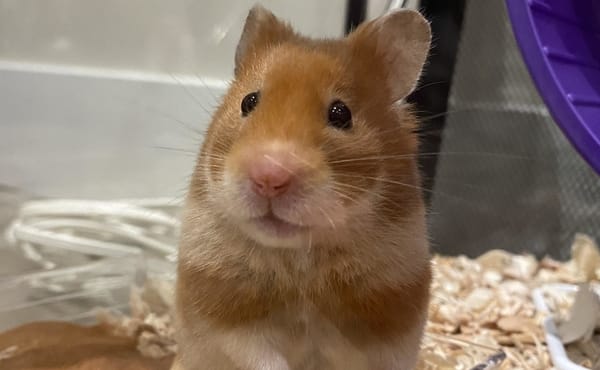
They Like What They Like
Individual hamsters have their own unique personalities and preferences. Many hamsters love running relentlessly in their wheel while others would rather lounge on it. Some hamsters have favorite treats while others would gladly accept anything edible.
If your hamster has been rolling and you do not suspect stress or illness as the cause, look for other signs of happiness or contentment like yawning and stretching.
Your hamster may simply enjoy the feeling of rolling around to relax! If this is the case, there is clearly no reason to be concerned, but keep in mind that while your friend is enjoying itself, do not try to pick it up until it is back on its feet. Remember the tips for helping your hamster feel safe and welcome as discussed above and relax right along with your pal.
Conclusion
If your hamster is rolling on its back, it most likely is trying to bathe itself. This could be for several reasons, but it would help your furry friend to offer a sand bath. Conversely, your hamster could be experiencing stress or fear, particularly if you notice the behavior is compulsive or is coupled with behaviors like exposing incisors.
Help your hamster feel safe and secure in their environment to alleviate these feelings. Your hamster may also be exhibiting signs of illness, particularly conditions affecting the vestibular system. Be on the lookout for other symptoms and always be ready to take your furry friend to the veterinarian for treatment.
Beyond any of these factors, your hamster may just like rolling around! If they are eating normally and displaying other signs of contentment, there is nothing to fear.
In any case, if you are aware of the context surrounding your pal’s behavior, you will always be able to pick up what they are trying to tell you and help them so you can enjoy each other’s company for years to come.

